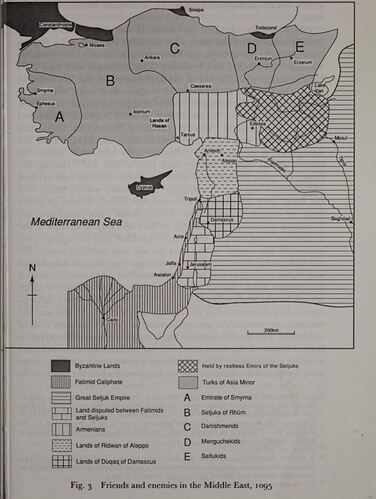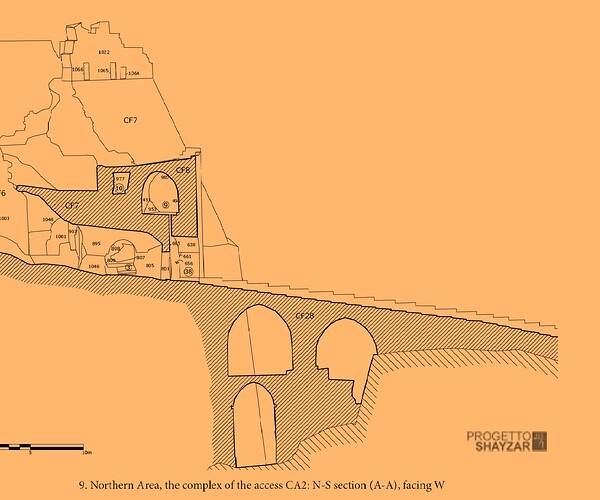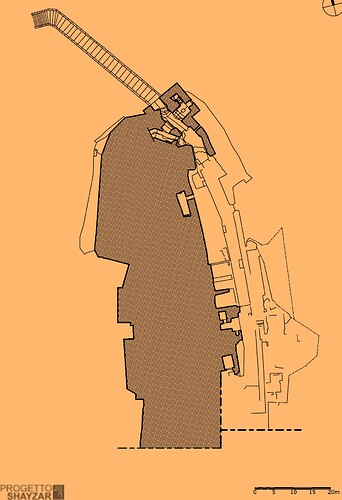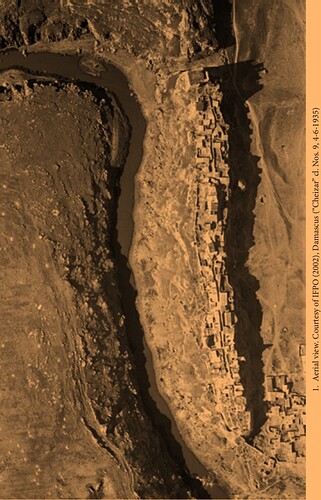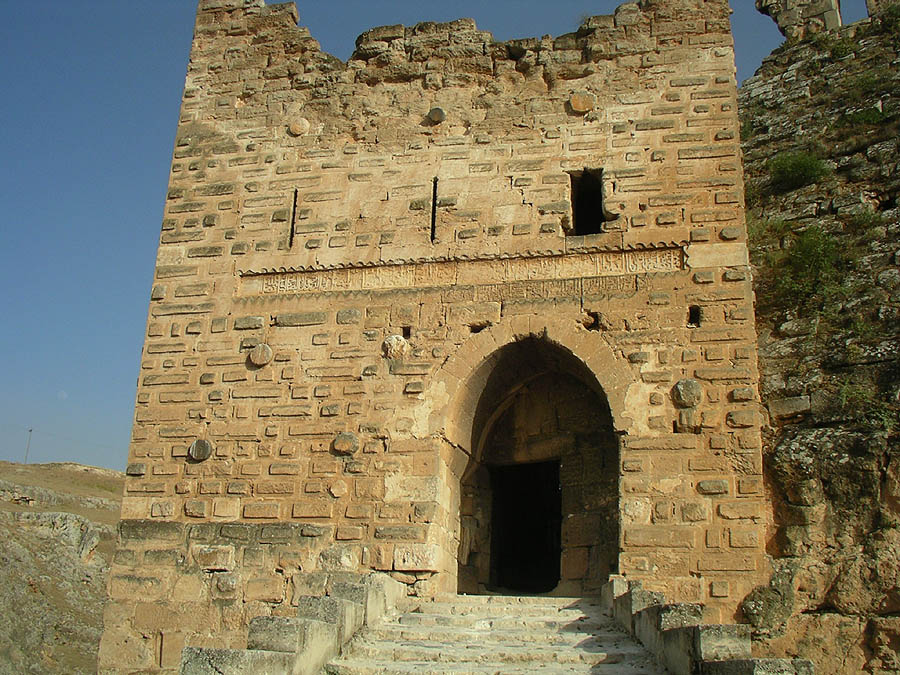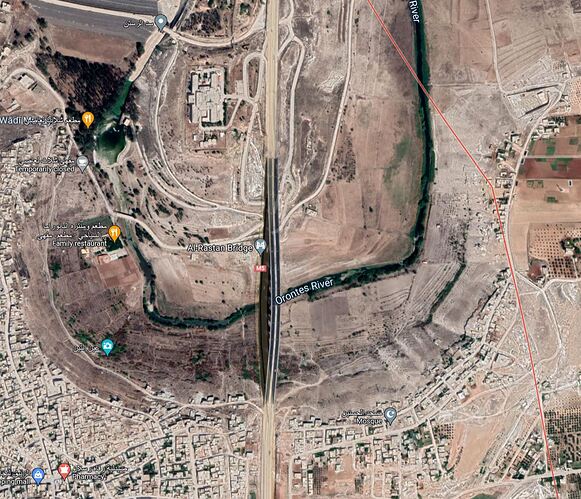You're very welcome! I'm glad to be of service. ![]()
I've moved this thread to the new Actual Play area, which I just created at the request of Heaven's Thunder Hammer. Enjoy!
Just as a follow-up to my previous comments about the Byzantines, with more specifics: I'm currently reading Jonathan Harris' fabulous Byzantium and the Crusades. He notes that in the wake of the crusader defeat of the Seljuks at Dorylaeum in 1097, Alexios Komnenos took advantage of the disarray of the Seljuks and sent his brother-in-law John Doukas with an army into Asia Minor, and they conquered Smyrna, Ephesus and Philadelphia. The Byzantines would take more territory in Asia Minor in the wake of the crusade of 1101, including on the Black Sea coast (p. 64). So we do see a more aggressive stance from the Byzantines, which I imagine in your game could become even more pronounced.
I hope that this is helpful! ![]()
@niallchristie thank you for the information. I had read similar pieces of information in other text books, or maybe even this book itself a back in December. (I read so much back then I can't exactly remember which books I read and haven't read, organizing them better now.)
In the game, Kilij Arslan had to give up much of his territory for a 10 year truce. In the map below, The other maps I've seen have the Sultanate of Rum larger and the Danishmend smaller, though I had been under the impression Kilij control around Ankara, so with some handwaving, I'm assuming Ankara is his new capital.
However, there was the historical Emirate of Smyrna, which was not part of the treaty. This Emirate will have been conquered by now in 1098 game time. My assumptions are that Alexios will be a bit ahead of historical schedule, but not by a lot. Antioch was captured in September, the news would have travelled to him by December/January, accelerating his schedule a bit. So maybe it's May 1098 when he is in Philomelion, and June 1098 in Antioch.
This is cool. Historically, the Seljuks of Rum moved their capital to Konya in 1097, and it remained their capital until 1243 and the Mongol invasion. Ankara, meanwhile, was taken by the crusaders from the Danishmendids in 1101 and then given to the Byzantines, only to be taken by the Seljuks at an unknown date, taken by the Danishmendids in 1127, then taken again by the Seljuks in 1143, and then held by them 1243. Of course, given the damage that has been done to the Danishmendids in your game, the Seljuk takeover that you have had happen already makes sense.
Of course, now you have to decide if the crusaders will still have a go at Ankara in 1101, if not before. ![]()
That's some useful information, I hadn't realized Ankara got overrun so much. I'll have some thinking to do on the future of the Sultunate of Rum... Unless they can prevail over, or ally with the Danishmend, they're squeezed between a hammer and anvil.Then again, they could do something like ally with Byzantium to fight other Turks.
This could collide badly with whatever successive Crusade happens after the First Crusade ends. Given how well it's going so far, I have a feeling there could be an even bigger follow up Crusade in 1101. Any thoughts on that?
Given the aggressive stance of the Byzantines, I would imagine that the Danishmendids will be the more obvious ally for the Seljuks. That depends, of course, on how the Danishmendids are doing after the damage that they suffered.
The crusade of 1101 could either be a bigger expedition or a smaller one. It depends on how effective the recruiting is at capitalising on the success so far and how the message is received. It could be "Great, folks! Let's go join a successful bandwagon," or "You're doing just fine. You don't need more help." ![]()
Notes: I’ve updated Antioch II, as the Archmage Leto of House Tytalus went into Final Twilight during the battle.
Aleppo II
Yes, Bohemond captured Aleppo, but after the high of a victory, the devastation wreaked on the city turned it into a pyrrhic one.
Kaldas, not letting a good situation go to waste, was the first to loot the ruins of the Order of Solomon’s House of Wisdom of Aleppo with the help of his bound Jinn. Some vis and items of interest were found. The other Flambeau and Tytalus were uninterested in looting much beyond vis.
A funeral was held for the Flambeau magus Natalia, from an Italian covenant, who perished in the fighting in Aleppo along with several shield grogs. This leaves the contingent now down 3 of 33 magi from the start: 1 Criamon, 2 Jerbiton, 8 Flambeau, 1 Tremere, and 18 Tytalus.
Repairing the city's walls was a huge undertaking, not to mention feeding the survivors. Aubert helped organize rubble clearing and provided care for survivors along with help from the clergy. His wife Velkonia assisted as well, since she has learned some Armenian and speaks excellent Greek.
Bohemond's mood quickly soured and was frustrated with damage from the earthquake. He asked Aubert for a meeting with Kaldas to "discuss some solutions."
This created a problem for Aubert/Kaldas, as he could not be in two places at once. Neither was his Finesse up to snuff to create an illusion. No. Instead he just arranged a meeting with Kaldas and Bohemond, claiming that night to be too ill to attend, and the player had to make a convincing guile roll. (Historically illness was common and many of the leaders fell ill at various points.)
Naturally, this was hosted in Aubert's pavilion so Bohemond would not be seen to be directly consorting with wizards. Bartamaeus had sufficient shape changing ability to act as an ill Aubert.
As Kaldas, they had a discussion about what kind of aid the wizards of the Order of Hermes could provide. Kaldas explained the basics of the Order and magical capabilities... And vis. A substance typically ignored by Mundane rulers, and one they could technically leverage. Bohemond asked for Kaldas' help to meet with and cut a deal with the Flambeau magi.
Kaldas spoke with the Flambeau. The two Archmagi, Gwyneth and Katriana, had some opinions. Kaldas suggested that fixing a city damaged by magic was in fact repairing a previous instance of mundane interference. That so long as the deal didn't involve fighting armies, and instead fighting supernatural threats such as Jinn or Solomonic wizards, it was at least loosely within the Code of Hermes. Also, he warned Bohemond about the effects of the Gift, that something about using magic made most wizards come across as rather disturbing and dislikable.
Kaldas was open about being an exception to the norm. Though, I have throughout the game sessions emphasized the wide birth even Kaldas receives as a wizard, Gentle Gift or not.
The actual deal making itself again required Aubert's and Kaldas' presence. Aubert to host, and Kaldas to make negotiations. This time the PC had to make a choice, the other wizards didn't know him as well as Bohemond knew Aubert... So, he made the choice to have Bartamaeus assist with the negotiations posing as Kaldas.
Bartamaeus, a sneaky, playful and mischievous Jinn, did a fantastic job on helping Bohemond and the Flambeau negotiate an agreement.
“Kaldas” even offered the Flambeau who would stay behind two rooks of vis to help “get them settled.” Three Flambeau accepted the terms, Aislinn, the Rego Terram specialist, was an obvious choice, along with the Archmage Katriana and one other. They could take any magical aura in the city as a proper covenant site and claim all vis in a 3 days' ride around the city. In return, they would repair and reinforce the walls of Aleppo, and defend the city from supernatural threats.
In fact, Bartamaeus even did such a good job that “Kaldas” received his first Hermetic reputation as a “Smooth Diplomat.”
In light of the large number of homeless, Aubert decided to try and recruit from the displaced Christians in the city, who are primarily Armenian. (According to “Aleppo, a History”, the Christians in the city were primarily Armenian.) Procuring a nameless translator, he gave a stirring speech (roll of 23) to convince them to join the holy pilgrimage and fight to retake Jerusalem. The nameless translator botched. Hard.
Again, using my chart, I against odds, had a critical success as the implications of the botch. But it’s a still botch. Aubert got the useful Christian men who could fight. And their wives, and kids, and relatives, elderly parents, useless cousins, random vagabonds and beggars and so on. Aubert doubled the size of his nation, but only a small fraction of that was in direct combat power. Future logistic rolls for him will be at a higher threshold, not to mention the lost supply wagons due to the earthquake.
The armies left after a week of attempting resupply and repair to some of their wagons. On October 12th, they left behind a skeleton crew of volunteers to rebuild and garrison the city.
Onward to Ma‘arra.
Given how well the crusaders are doing, presumably they won't have the same issues with supplies, and the consequent cannibalism? ![]()
Of course, you could have some cannibalism anyway, maybe done for the psychological effect?
Interestingly enough, the cannibalism as Ma‘arra isn't mentioned in the Muslim sources at all, though it's notable that a number of Muslim cities subsequently came to terms with the crusaders...
The initial march out of Aleppo went through the southern Dead Cities of Syria.
One might ponder the reason for their abandonment in terms of altered trade routes, climate change, or perhaps raiding by Bedouin. Do not forget more supernatural causes. The Holy Pilgrimage experienced terrible dreams passing near them. Ghostly wailing throughout the night. Animals lamed. Children falling ill. The minor but pervasive Infernal Auras belied a more sinister ending.
Aubert's cursory investigations revealed much. Graffiti of birds with human heads, even the carved words in Greek: "why do birds have human faces?" Littered throughout the places he searched.
Kaldas went a step further to study the influence of the Unholy Consult. He sought out the wailing spirits and Commanded them. Unfortunately, by this point they were gibbering wrecks and quite useless. Kaldas did Command dozens of them to "Follow Me." The rest he sent away to stop terrorizing the Holy Pilgrimage.
The minor villages and the town of Idlib surrendered to Bohemond, he took their oaths of loyalty as the new Prince of Aleppo.
Ma'arra however, did not submit.
Feeling secure in their walls, the local Emir first tried to buy off the crusaders, which failed. Bohemond would accept only Ma'arra's Emir's Oath of loyalty. Without that, the Holy Pilgrimage invested the city.
Kaldas intervened at night using the Commanded ghosts and bound Jinn to psychologically terrorize the town. Some night raids on the walls proved effective. Controlling the spirits proved difficult and Kaldas lost a few each night.
Unknown to Kaldas, the local Sahirs heard of the great defeats in Antioch and Aleppo. Wisely, they fled Ma'arra. Without the Sahirs, the local Emir had no counter to these tactics. After three days he offered a full surrender of the city. Bohemond demanded tribute to not sack the city first, and received it. Ma’arra’s emir and his family were enslaved and sent as gifts to the Emperor.
After that, the size of the army and the successful and short sieges of Antioch, Aleppo, and Ma'arra had ripple effects. The local emirs of Kafartab and Apamaea sent messengers pleading for peace and favorable terms ahead of the Crusade's arrival. Bohemond allowed the exile of the two Emirs and their families to Mosul.
This greatly angered the Banu Munqid family, who controlled the area. The Emir Sultan ibn Ali, the family’s leader based out of Shayzar, refused to surrender. However, he did not factor in the feeling of the substantial local population of Christians, who wanted to surrender to a merciful army. Recognizing a security risk, they were expelled from the city ahead of the Crusade's arrival, while Ibn Ali's forces retreated into the large Citadel of Shayzar. (It is about a kilometer long and 120m wide and sits on a large hill.)
Author’s Note after the fact: It was not clear to me at the time that the medieval city of Shayzar itself was walled. My assumption is that because of the massive citadel, the city had a short wall of little note, relying primarily on the citadel to deter attacks. However more recently I found out that the Mongols (or Mamluks?) razed the city walls in around 1260.
Attached are some pictures to understand the geography of the situation.
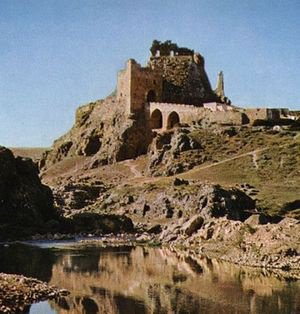
The book “Shayzar I, by Cristina Tongini” had some neat maps in the appendix. From what I can tell, you have a 60 meter open approach on a bridge maybe 4 meters wide tops, allowing 4 men abreast to approach, and don't forget the 30 meter drop off the side of the bridge too. Remember, there are no guard rails.
Then, assuming you even get across the bridge, there is a tiny door as the entrance, allowing entry single file, maybe double file into the Citadel.
Suffice to say, even Kaldas’s ingenuity and (limited) magical capabilities were nowhere near capable of manipulating coincidences in Aubert’s favor. So, he did the next best thing, and convinced the Flambeau magi and Russian Tytali to sneak in using magic and conduct a large raid.
Kaldas scouted around, and saw a significant number of blue muscly Jinn, seemingly water based, floating around and keeping an eye on things. Bartamaeus's scouting and spying informed him of a multitude of Sahirs in the citadel... And that the Emir and his family were most of said Sahirs.
Again, Aubert let the other leaders know about a planned "raid" from his nation using "greek fire." Robert of Flanders was resigned to the euphemism for wizards, Robert of Normandy gave a knowing wink, while Bohemond and Tancred cackled with glee.
The Archmaga Gwyneth had an enchanted item that created a troop transport platform large enough for all 10 to fit. Some invisibility spells helped with the stealth. They bypassed the Jinn by using this device far away and went very high into the air, went directly over top, and did a fast drop into the Shayzar citadel on the eastern side next to the river.
The raid was successful, but also turned into a slug fest with piles of guards and many Jinn surrounding them, forcing a retreat.
The next night, they attacked again with similar results. It was at this point that Kaldas botched a melee attack roll against one of the blue Jinn... The giant warhammer got sucked into the Jinn's body. This meant the Sahirs augeries against the Hermetics were far more effective and focused because of the Arcane Connection to Kaldas.
The third raid using the same method as before was a disaster on multiple levels. The Sahirs were ready for the attack, and in the mean time had summoned several significantly more powerful Jinn.
Gwyneth botched her leadership roll to coordinate the attack. The Russians got overwhelmed and but could not turn into Giants due to the mission. Kaldas got into a melee battle with Afdal-Kathir, a mighty fire ifrit, and both took some noticeable wounds, but the fight was not decisive. Also, Kaldas turned into a porcupine from soaking the archery fire at him.
One of the Flambeau panicked and unleashed a Perdo Corpus massacre spell, a sight ranged spell that inflicts a thousand people with a heavy wound. And with it Mastered, could multicast it. Kaldas felt his Parma Magica reflect the spell over a dozen times throughout his duel with Afdal Kathir.
Eventually Theodard, one of Gwyneth's lieutenants, came to extract Kaldas. At the look of confusion on Kaldas’s face, announced that the Archmage had died casting a spell to save the rest of them.
Getting onto the troop transport platform under heavy archery fire, and melee and ranged assault from the various Jinn, one of the Russian Tytali, Dagne took an arrow under through her left armpit into her heart and died. Kaldas watched in heavy fatigue as Norah of Flambeau cast spells to slay them. As they left, Kaldas felt a strange sickly feeling grow around him of a new Infernal Aura.
In the morning, the Castle of Shayzar was silent as a tomb. No one manned the walls. Fearing a trap or trick of some kind, the crusaders waited a day before entering. Kaldas used this time to sneak in... He discovered the entire inhabitants of the castle dead. With their masters dead, the Jinn had left.
The player was not as curious as he could have been about how everyone died.
And a significant Infernal Aura from the massacre. Not wasting time, Kaldas investigated what he could in the Sahir's and Emir's quarters and laboratories. He found a couple dozen enchanted items of Sahir design, lab notes, correspondence, and a small library. Leaving nothing to waste, Kaldas summoned and bound the slain Sahirs' spirits to rocks, carving their name into them. No vis was found, as it was used up summoning Jinn to protect the Citadel.
Eventually, after waiting a day to see if it was a trick of some kind... the Crusaders approached. No arrow fire. No response at all.
I should note at this point the player did not ask the Flambeau who cast the massacre spell how everyone died. The limits of Sight range and group targets meant there should have been survivors somewhere!
In hindsight, the player is newer to the game and doesn't have the Hermetic magic system memorized. Otherwise, they might have caught some more clues.
Aubert led a group of men through the main gate where the Holy Pilgrimage found the slaughter. Investigations found few clues, and the player made many rolls with confidence points to build the following narrative:
The Emir faced a coup d'etat from a faction that wanted to surrender and they killed each other completely in the process. No, this wasn't terribly believable, but the Crusaders weren't going to question a victory of a nearly unassailable Citadel.
Then when the looting of the Citadel happened... The question of what to do with the bodies arose. An argument favored by Aubert and the Bishops was to bury the bodies in mass graves. Bohemond and the two Robert's of Flanders and Normandy argued for tossing the bodies off the side of the citadel towards the river. Tancred complained there was no one to ransom for more loot.
The ick factor of the Infernal Aura in the Citadel meant the men doing the work wanted to be out of there as soon as possible... So off the side the bodies went... Thereby increasing the Infernal Aura even more. With his second sight, Kaldas spotted many human headed owls eating the flesh with the mass of carrion birds that attacked the corpses. The Unholy Consult had a hand in what happened.
While the Crusaders were not directly at fault... The people of Syria did not know the difference. Wild rumors spread of the massacre, casting them as heroes of Christ to the Christians, and barbarians with an insatiable bloodlust to the Muslims.
Bohemond took oaths of loyalty from the Christians of Shayzar, and November 1st, the Crusade left to Hama. Meanwhile, the player for Kaldas spent adventure XP to learn Afdal Kathir's True Name, and using much of the vis looted, summoned him for a year as a bound Jinn.
The Wizards of the Order of Hermes held a funeral for their two slain sodales, once 13, now 11.
(4 Flambeau, 4 Tytalus, 1 Criamon, 1 Tremere, and 1 Jerbiton.)
Notes: I can add more dates if anyone is curious. If there are any historical questions, please let me know and I'll try to answer.
Interesting! So we get something like the psychological effect of the cannibalism at Ma'arra, but placed at Shayzar instead. And what are the Unholy Consult up to, I ask myself...
At the time that these events took place, the best known member of the Banu Munqidh, Usama, would have been 3 years old. Presumably he would have been killed in the events, thus depriving the world of the most entertaining source from the crusading period...
Yes, exactly. I'm trying to emphasize to the player that he can try to rein in the brutality some, but also not whitewash the recorded historical accounts. One author I read pointed out that the Europeans had "rules" and the Muslims had similar but different "rules" of war... But when the two sides met, these rules were dropped because they were seen as "the other."
Usama has shown up in various books I've read, and sounds like quite the character. I have not read a translation of his book, but have put it on my reading list!
I would actually dispute that claim. ![]() In a general sense, the Franks and Muslims usually observed similar standards regarding how the enemy should be treated (not killing prisoners, women and children, etc.). The main exceptions were often the result of heated emotions (e.g. when a bunch of rather excited crusaders broke into Jerusalem, finally achieving the goal that they had suffered for over the last couple of years) or expediency (Richard the Lionheart's killing of prisoners at Acre was probably a result of not only frustration at Saladin's delays in paying their ransom but also a need to move on with his campaign without having to sort out what to do with a bunch of extra mouths to feed and guard.
In a general sense, the Franks and Muslims usually observed similar standards regarding how the enemy should be treated (not killing prisoners, women and children, etc.). The main exceptions were often the result of heated emotions (e.g. when a bunch of rather excited crusaders broke into Jerusalem, finally achieving the goal that they had suffered for over the last couple of years) or expediency (Richard the Lionheart's killing of prisoners at Acre was probably a result of not only frustration at Saladin's delays in paying their ransom but also a need to move on with his campaign without having to sort out what to do with a bunch of extra mouths to feed and guard.
Many rulers were also pretty good about making and keeping truces, though of course there were plenty who broke them, when it suited them, on both sides. Muslim chroniclers in particular report the breaking of truces as a common habit among Franks, as it happens, I'd say more than we see the other way round in the western sources.
That's good to know, as one book I read claimed otherwise, that both sides were more brutal with each other than say, the treatment in French vs French conflicts. And yes, for sure, the capture of Jerusalem and treatment of captives in the 3rd Crusade were particular egregious examples.
Yes, I've read that a common Muslim characterization of the Franks is how incredibly duplicitous they were. Something I've tried to emphasize with the PC is how much reputation matters, and so that he should act accordingly if he wants to be treated well by Muslim Nobility/Rulers.
Homs I
The Holy Pilgrimage proceeded from Shayzar to Hama with good Time. After the massacre or madness of Shayzar, Hama couldn’t surrender fast enough.
Bohemond, through some subterfuge took the surrender of the Turkish mercenaries who garrisoned the town in person. At that point, he had them slain so they would not harass his new conquests in the north, or go reinforce Homs in the south.
The Emir of Hama was allowed to flee south with what he and his family could carry on their persons. (A common term of surrender in the region according to my research.) Due to supply losses, the city of Hama was also forced to pay a tribute in food, wagons, horses, and sundry items. After a 3 day stay, they left November 6th.
On the longer march to Homs, Aubert organized and deployed an exceptionally effective scouting array.
The Holy Pilgrimage suffered some issues from raiding at night. Aubert made better defensive arrangements and coordinated with his scouts to attack some of the raiders’ camps. Other than being Turkish, he wasn’t sure if they were part of an organized resistance or simple opportunists. As the author, I can tell you these are “Wild Turks” on their own raiding the frontier, a common issue during this time period.
In addition, Kaldas made arrangements with the remaining Flambeau magi and Russian Tytali to magically search and kill enemy scouts to blind any enemy armies.
On the longer march to Homs, Coemgin ex Criamon had a vision (or seizure, depending on your POV) of the rising Red Star. The next night a strange new Red Star appeared in the sky. The Holy Pilgrimage was of multiple minds, some taking it as a good omen, some not.
Hero ex Tremere conspicuously kept to herself and was unavailable.
Æþelbeorht ex Jerbiton was characteristically friendly as usual... He and the other Flambeau put little stock into the stars.
The remaining Russian Tytali met with Kaldas, believing the Red Star to be a profoundly ill omen in light of Dagný’s death. Hávarõr her husband, with Veceslav and Njáll, their sons, all wanted Revenge.
Kaldas had strange and terrible dreams about the First Apocalypse of the Schism War: Seswatha faced the No-God, a man of living metal over a 100 feet high, and distorted reality with his mere presence causing a localized storm and tornado around him. And a Red Star so close to the earth and so bright that one cast a shadow at night time.
Hyperiax, Kaldas’ master warned him that this was a very ill omen indeed. That it reminded him of the destruction of House Seswatha’s Domus Magnus in Baalbek. (Which by the way, Kaldas received strong warnings not to approach it; apparently it was heavily trapped before being abandoned.)
Within a few days, the Hermetic wizards reported killing a consistent number of mounted scouts, and coming from the south. Mortal scouts soon reported a sizable force at a strategic bridge near Al-Rastan.
This location is a sizable east-west valley with the Orentes river in the middle and small bridge across it. Just beyond the south side, up above the hill lay a force about half the size (10,000) of the crusaders in wait for the Holy Crusade (25,000) to come from the North. The Syrian army (led by Duqaq) could make a decisive attack downhill if the Crusaders forded the river at this bridge.
Aubert called a council, and they made the difficult decision to push forward overnight to ford the Orentes several miles upstream to the east. Kaldas asked the Hermetic magi to create a magical large dust cloud to obscure their movement to the east.
Once that was done, they agreed that the army would detach from the supply train and ambush the Duqaq's army. Risky, but with the Syrians believed to blind from all the scout killing, worth it.
The Crusaders marched overnight to ambush Duqaq. It mostly worked, but with difficulties traversing the terrain, did not make it there in time for a pre-morning ambush and were spotted.
However, the Crusaders got enough of a jump that Duqaq's forces were in an organized retreat to Homs. They had left their baggage train as a temptation to break discipline for loot.
With Bohemond leading the Vanguard and sensing weakness, he pounced and sent orders to attack, deciding to pursue the army before it could reinforce Homs.
At this point, all of the Warlords made a Leadership roll. Duqaq rolled poorly (14), with Bohemond rolling well (21) Aubert lucked out (31) at just the right time with Robert of Flanders rolling poorly (14) as well and Robert of Normandy making a competent roll (17). All leaders used confidence points.
So, as a result Bohemond's charge forced Duqaq's army to engage, allowing Aubert to make a fast dash to the south and halt Duqaq's retreat. The Robert's circled from the North and eventually joined the battle.
This is when a couple hundred Sahirs dropped from the sky on flying carpets.
They joined the battle with a Thousand Jinn at their command. If it were not for the Russian giants and the Hermetic Wizards who immediately met the force in battle, the Crusaders would have routed. While small in number, the Flambeau had powerful vis-enhanced spells and the Giants were attention magnets.
The Crusader generals had to make rolls to control their men (they all passed) despite the magical war in the sky around them.
With magically enhanced vision (Eagle Eyes) Aubert personally managed to identify Duqaq and engage him in personal combat and win. In the end, the Crusaders decisively defeated Duqaq’s army, and his forces broke and tried to flee on the plains to the west. Duqaq, along with the Emir of Homs, Ganah Al Dawla Ibn Malaeb1, were captured.
Aubert increased his reputation again for the capture of both men. The dead were a feast for the crows, And again, for those with second sight, owls with human heads feasting on the abundant human flesh. The Unholy Consult always comes out stronger through death.
Note 1: The only source I came across with his name is in Negotiations between Muslims and Crusaders at the Crusader invasion of the Levant (489-492 BC/1096-1099 AD) by D. Ghassan Mahmoud Washah.
Note 2: Tagging some other members who have read this thread, as they may wish to subscribe (or not, that's fine).
@rgd20 , @LadyAth , @Oneshot , @Tugdual , @temprobe , @Ignes.Festivus , @YR7 , @Xavi , @Ovarwa , @Red-Shadow-Claws
Note 3: Some what I'm trying to emphasize is that neither the Order of Hermes, nor the Order of Solomon really know what to do in terms of optimizing their magic for (1) fighting armies or (2) fighting each other. What I'm trying to show is a steady escalation of techniques and tactics using the respective magical strengths of each side.
I do read this thread every now and then even if I'm not tagged. Sounds like you're having fun ![]()
Great, glad to hear you're enjoying the Actual Play. It's an absolute blast, reading the history is super interesting, and the sessions are a lot of fun too. ![]()
Yeah, not one of the most prominent figures in the period. ![]()
To find out who was ruling what and when, I highly recommend Clifford Edmund Bosworth, The New Islamic Dynasties, which is essentially a manual recording such things.
Ah ha, very useful, thank you!
You're welcome. ![]()
